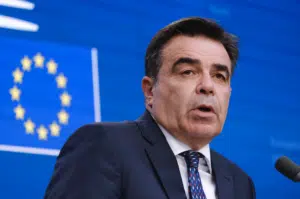From the correspondent in Strasbourg – While the press attention this week was all about the European Parliament’s many final votes on several new EU legislations, a disgraceful episode was staged in the Strasbourg press room (named after one of Europe’s martyrs for freedom of expression, Daphne Caruana Galizia) in terms of content, vehemence, and gratuitousness of the accusations by one of the European Commission’s top officials on the issue of migration.

“Since you are interested in politics, let me point out who doesn’t like the agreement on the Migration and Asylum Pact,” were the words of the EU executive Vice-President for European Way of Life, Margaritis Schinas, responding to a journalist’s question during a press conference on Tuesday afternoon (March 12) on the Communication on Migration and Asylum Management: “Those who don’t like the Pact are Putin’s friends, the far right and the far left, who are targeting it.” There are several possible levels of analysis of this attack, such as the one already presented by Eunews on the shift of the narrative on migration by the chairwoman of the EU Commission, Ursula Von der Leyen, toward a securitarian logic, but what is most troubling is Schinas’ choice of “negativity” references. To brand critics of the Migration and Asylum Pact nearing final approval as “friends of Putin”—a dictator responsible for invading a sovereign country and wanted by the International Criminal Court—is an act of verbal violence bordering on censorship. Not least because one sees no logical correlation between a pro-Putin positioning and support for policies that focus on the rights of incoming migrant people.
In this sense, it should be strongly reminded that “those who do not like the Pact” are not just “the extreme right and the extreme left”. But there is a world of civil society organizations, human rights lawyers, investigative journalists, academics, and humanitarian workers on the ground who have long criticized the implications of grounding the Migration and Asylum Pact with full knowledge and having thoroughly studied the texts. Calling them “Putin’s friends” to discredit their criticism of its content and future implementation is not only a questionable modality but also a dangerous one because of the implications of criminalizing the opposition: if anything that opposes the “support of three-quarters of the political forces represented in this Parliament” can be branded as being “Putin’s friend,” then the space for dissent and freedom of expression is dramatically reduced. Because no one (or almost no one, because of “friends of Putin” there are even in the EU Parliament) would want to be associated with an autocrat with hands stained with the blood of tens of thousands of dead in Ukraine. Least of all, if, at the same time, one is working for the greater protection of the rights of people arriving at the borders of the Union, contesting the fact that “what we have created is a text fully compatible with the values on which the European Union is based” (as claimed by Schinas).
Then, we can talk about content. One does not have to be a “friend of Putin” to wonder how some new introductions in the Migration and Asylum Pact are really “fully compatible” with the values of human dignity, equality, and human rights on which the Union is founded. For example, the border procedures under the Asylum Procedures Regulation (Apr) provide for de facto detention of up to six months, even for unaccompanied minors and families with children under 12 without access to legal representation, but only to counselling. Or that, more generally, the Screening Regulation allows for the detention for seven days of all migrants arriving at the Union’s borders through the so-called “fiction of non-entry” (i.e. that anyone screened at a special centre will not be considered legally on the territory of the member state and thus the EU). Or that the Eurodac Regulation requires the acceptance of the collection of biometric data to all temporary protection beneficiaries from the age of six years, even though for the General Data Protection Regulation (GDPR) the processing is lawful only if the minor is at least 16 years old. These are just some of the critical issues that have already emerged, without even having to go into the very slippery field of the concept of “safe third country” for rapid returns, on which British “Rwanda model” scenarios are already opening up, according to the Manifesto of the European People’s Party. The same political family of von der Leyen and the Greek Schinas.
English version by the Translation Service of Withub





